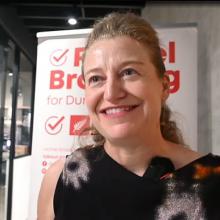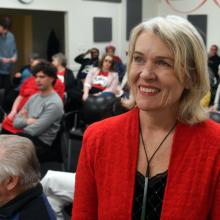
Results are still to be finalised on November 3, after about 500,000 special votes nationwide are counted, but as things stand, Dunedin goes into the new parliamentary term represented by five MPs — two from Labour, one from the Greens, one from New Zealand First and one from Te Pāti Māori.

It was a nervous night for Dunedin Labour MP Rachel Brooking and Taieri Labour MP Ingrid Leary, who both won their seats on Saturday’s count.
Dunedin
Ms Brooking, a list MP last parliamentary term, took over as Dunedin electorate candidate from retiring MP David Clark.
Her election night tally stood at 14,596, with a comfortable winning margin of 7160 votes.
"I am very grateful to the voting public of Dunedin that they have had confidence in me ... but also I am heartbroken about the national result," Ms Brooking said.

Taieri
Sitting Taieri Labour MP Ingrid Leary had a tough night, watching nervously as the voting tally fluctuated before coming out on top with 14,677 votes on election night, a majority of 1308 over National candidate Matthew French on 13,369.
With about 5000 special votes still to be counted, Ms Leary remains "cautiously optimistic".
The Taieri electorate will send a further two MPs to Parliament, with Green candidate Scott Willis and New Zealand First candidate Mark Patterson both becoming list MPs.

With the party receiving 10.77% of all party votes, candidates down to No 13 on the list were elected.
Lawrence farmer Mark Patterson, a New Zealand First backbencher in 2017, returns to Parliament as a list MP, after his party received 6.46% of the vote.
Paying tribute to party leader Winston Peters for his energetic campaign, Mr Patterson said the party was awaiting the outcome from about 500,000 special votes still to be counted, but that it would be "a very different Parliament".
Te Tai Tonga

Te Pāti Māori candidate Takuta Ferris won the seat from Labour incumbent Rino Tirikatene, with a majority of 1463 votes.
Mr Ferris received 9426 votes to Mr Tirikatene’s 7963.
Mr Ferris felt there was a generational shift, and the party had put in "a huge effort" to win the seat.
Mr Tirikatene will remain an MP due to his high placing on the Labour party list.
Coalition negotiations

On Saturday, the National Party received 39% of the preliminary results, meaning Mr Luxon will lead the next government.
Labour received 26.9% of the vote, with the Green Party on 10.8%, Act New Zealand on 9%, NZ First on 6.5% and Te Pāti Māori on 2.6%.
More than 500,000 special votes are still to be counted before a final tally can be posted by the Electoral Commission on November 3.
At present, National and Act could govern alone, but special votes could mean NZ First is needed.













